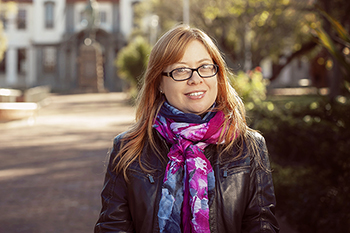Latest News Archive
Please select Category, Year, and then Month to display items
12 January 2024
|
Story Nonsindiswe Qwabe
|
Photo Sonia Small
 Since joining the UFS in 2008, Dr Grey Magaiza has worked extensively on approaches that can foster the socio-economic transformation of societies.
Since joining the UFS in 2008, Dr Grey Magaiza has worked extensively on approaches that can foster the socio-economic transformation of societies.
“The future should be one where communities can decide on their development agenda and futures. That’s the most important for me.” Dr Grey Magaiza, Deputy Director of the Centre for Gender and Africa Studies (CGAS) and Head of the Community Development programme on the Qwaqwa Campus, is passionate about capacitating communities to be agents of change and advancement. His vision for the future emphasises the empowerment of communities to take charge of their development by actively participating in decision making and the implementation of development projects that can improve their lives.
Since joining the UFS in 2008, Dr Magaiza has worked extensively on approaches that can foster the socio-economic transformation of societies. Over the years, he has crafted his research speciality into one that he is most proud of – being an interdisciplinary scientist immersed in the development of communities.
“I’m in a fortunate position of researching what I like. I say ‘fortunate’, because I’ve taken the time to understand what I’m passionate about, which is the overall field of rural livelihoods and livelihood futures – in short, community development. My research starts from an engaged university, understanding the elements that a university must use to enhance transformation and relevance to its immediate community in terms of development.”
One of the ways he has done this is by looking at social entrepreneurship as a development approach for young people in a rural setting. Through workshops with non-profit and civic organisations in Qwaqwa, Dr Magaiza has been helping these organisations to map out their needs and actively meet them through the involvement and support of external role players.
“We understand that communities are part of the national development agenda, but even that national agenda respects community knowledge and intentions and allows communities to shape their identity. A critical enabler of this is community organising. You bring back the capacity in communities to have dialogues on issues affecting them as spaces for engagement, knowledge exchange, and for people to just talk about their way forward.”
By enabling communities to define their development agenda, they can address their specific needs, challenges, and aspirations, he said. “When I look at livelihood futures, it’s quite an exciting aspect of my work – it’s like looking into a fortune tellers’ globe, because you’re not deciding for communities what they should do, but the communities themselves take those decisions.”
Leading African Studies scholar to represent UFS as research fellow at Leiden University
2016-03-10

Dr Stephanie Cawood to devote three months at the African Studies Centre Leiden as a visiting research fellow to further her research on the rhetorical imprint of Nelson Mandela.
Photo: Supplied |
Dr Stephanie Cawood, Programme Director and Senior Lecturer at the University of the Free State (UFS) Centre for Africa Studies has been offered a visiting research fellowship to the African Studies Centre Leiden (ASCL) at Leiden University in the Netherlands. The ASCL is entirely devoted to the study of Africa transcending multiple faculties and is known for its extensive library.
As a visiting research fellow from April to June 2016, Dr Cawood looks forward to expanding her network as well as intellectual horizons with the broad spectrum of knowledge archived by the ASCL. “Working so closely with the scholars at the African Studies Centre Leiden will enrich my research and broaden my international footprint as a scholar,” Dr Cawood says.
Her research at ASCL follows on her doctoral research on the former president of South Africa, Nelson Mandela’s rhetorical imprint, and will explore the conceptual, cultural, ideological and historical influences that shaped the thought and rhetoric of Nelson Mandela. She is particularly interested in studying the intertextual dynamics in Mandela’s rhetoric with historical figures such as Jawarharlal Nehru, Martin Luther King Jr and Winston Churchill.
According to Dr Cawood, this research “will deepen the understanding of Nelson Mandela’s rhetorical journey from struggle to liberation and unpack the various influences that made him the political figure he ultimately became.”
During her tenure at Leiden University, Dr Cawood will prepare a manuscript to be published by the ASCL as a working paper and also present seminars.